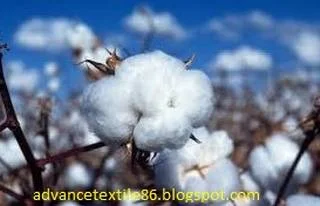Organic Cotton
Organic cotton is that cotton is grown naturally without using any chemicals or
pesticides. In subtropical countries like India, Turkey, China, and parts of The USA from non-genetically modified plants, and without the use of any chemicals
such as fertilizers or pesticides aside from the ones allowed by certified
organic labeling and it develops biodiversity and biological cycles. In The United States, the requirements applied by the National Organic Program (NOP)
from the USDA to be considered organic for cotton planting must also be met.
The agency sets out approved practices for pest control, growth, fertilizer,
and organic crop management.
Production process
Organic
cotton production does not mean the absence of inorganic synthetic fertilizers
and pesticides, it involves very careful planning of the entire agricultural
system. Organic cotton, in general, is grown using methods and materials that
have less impact on the environment with organic production systems and reduce
the use of organic pesticides, fertilizers, and create a biologically
diversified agricultural system.
Organic
cotton production uses natural chemicals such as sulfur dust and BT, not
insect-resistant biotech cotton and bio-control agents in pest-resistant and
pest management, and in organic acid-based leaf sprays such as citric acid and
nitric acid.
Advantages of organic cotton-
i.
Cost-saving because of not using fertilizer and other synthetic chemicals.
ii.
Naturally colored cotton is 20-40% cheaper than non-organic cotton.
iii.
Get a higher price on organic cotton and product.
iv.
Soft texture in organic cotton.
v.
All products are best for children
vi.
It is an eco-friendly product.
vii.
It reduced the risk of human beings
viii.
Protect surface and groundwater quality
ix. Replacement reduces the risk of pest and disease control pesticides with ecosystem manipulation
x. Long-term prevention of pests through beneficial habitat planting
xi.
Biodiversity conservation
xii.
Avoid the use of toxic chemicals in cotton
xiii.
Organically grown crops produce soils with higher organic matter content,
denser topsoil depth, higher polysaccharide content, and lower modulus of
cracks; therefore reducing the erosion to a sufficient extent.
Difference between organic and non-organic cotton
|
Organic cotton |
Cotton |
|
i. Organic cotton is defined
as cotton that is grown naturally without the use of any chemicals such
as fertilizers or pesticides. |
i. Non-organic cotton
is defined as cotton that is grown with the use of chemicals such as
fertilizers or pesticides. |
|
ii. This is a chemical-free process that doesn’t use any insecticides or pesticides. |
ii. Must use
different types of synthetic chemicals. |
|
iii. Not required
toxic chemicals to harvest the plant. |
iii. Required toxic
chemicals to harvest the plant. |
|
iv. Use untreated
seeds |
iv. Use chemically
treated seeds |
|
v. Doesn’t use GMO
seeds |
v. Must use GMO seeds
to make the plant resistant to bugs |
|
vi. For irrigation,
rainwater is required. |
vi. Intensive
irrigation is required |










0 Comments